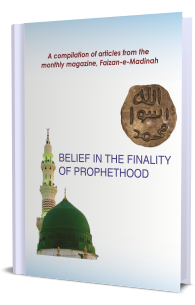Our Prophet: The Most Sublime, The Most Great
Seal of Prophethood
(Part 9)
Abun-Noor Rashid Ali Attari Madani
15. اَنَا المُقَفِّی قَفَّیْتُ النَّبِیّینَ وَاَنَا قَیِّمٌ ‘I am the last [prophet] to arrive [in the world]; I came after all of the prophets, and I am the epitome (Qayyim)’, (Al-Shifa`, vol. 1, p. 231; Shumaail-e-Tirmizi, p. 214, Hadith 361).
16. اَنَاالْمُقَفِّی وَالْحَاشِرُ بُعِثْتُ بِالْجِهَادِ وَلَمْ اَبْعَثْ بِالزُّرَّاعِ ‘I am the last to arrive and I am the gatherer. I was sent with Jihad, not farming,’ (Tabqat Ibn-e-Sa’d, vol. 1, p. 84; Shumaail-e-Tirmizi, p. 214, Hadith 361).
17. اَنَا الْعَاقِبُ ‘I am Aaqib,’ (Muslim, p. 958, Hadith 6015).
18. اَنَا خَاتَمُ النَّبِيِّينَ لَا نَبِیَّ بَعْدِی ‘I am the seal of the prophets; there is no prophet after me,’ (Tirmizi, vol. 4, p. 93, Hadith 2226).
19. اَنَا خَاتَمُ النَّبِيِّينَ وَلَا فَخْرَ ‘I am the seal of the prophets, and this is no boast,’ (Daarimi, vol. 1, p. 40, Hadith 49).
20. اَنَا آخِرُ الْاَنْبِيَاءِ، وَاَنْتُمْ آخِرُ الْاُمَمِ ‘I am the final prophet and you are the final nation,’ (Ibn-e-Majah, vol. 4, p. 414, Hadith 4077).
All of these prophetic statements describe the Beloved Prophet صَلَّى الـلّٰـهُ عَلَيْهِ وَاٰلِهٖ وَسَلَّم as the final prophet and unequivocally confirm our belief of the finality of Prophethood. This is also a unique and exclusive merit of the Noble Prophet صَلَّى الـلّٰـهُ عَلَيْهِ وَاٰلِهٖ وَسَلَّم which was not granted to any other prophet or messenger. It is mentioned in the blessed hadith that he صَلَّى الـلّٰـهُ عَلَيْهِ وَاٰلِهٖ وَسَلَّم was granted superiority over the other prophets عَـلَـيْهِمُ السَّلَام in six aspects, and one of them is his being the seal of Prophethood, (Muslim, p. 210, Hadith 1167).
Six blessed names of the Beloved Prophet صَلَّى الـلّٰـهُ عَلَيْهِ وَاٰلِهٖ وَسَلَّم have been mentioned in these reports: ‘المُقَفِّی’, ‘قَيِّمٌ’, ‘اَلْحَاشِرُ’, ‘اَلْعَاقِبُ’, ‘خَاتَمُ النَّبِيِّين’, and ‘آخِرُ الْاَنْبِيَاء’ صَلَّى الـلّٰـهُ عَلَيْهِ وَاٰلِهٖ وَسَلَّم.
The blessed name ‘المُقَفِّی’ is an active participle (Ism-e-Fa’il) in Arabic and according to ‘Allamah Saalihah Shaami, it means ‘the one after whom there is no prophet,’ (Subul-ul-Huda wal Rashad, vol. 1, p. 519).
According to the dictionary, it also has the meaning of ‘coming from behind,’ ‘following,’ and ‘being a successor.’ This meaning is also implied by the hadith as it adds ‘قَفَّيْتُ النَّبِيّين’, ‘I came after all of the prophets.’ This implication is also supported by another report: اَنَا المُقَفِّى بَعْدَ الاَنْبِيَاءِ كُلِّهِم ‘I am the one who came after all of the prophets,’ (Al-Istee’aab, vol. 1, p. 150)
The blessed name ‘قَيِّمٌ’ has broad implications and multiple meanings. The books of seerah explain it as ‘the one who is encompassing and complete.’ Arabic lexicons also define it as ‘supervisor,’ ‘overseer,’ ‘guardian,’ and ‘manager.’
A thing or individual can only be described as ‘قَيِّم’ or valuable when it possesses abundant merits, and there is no iota of doubt that the Beloved Prophet صَلَّى الـلّٰـهُ عَلَيْهِ وَاٰلِهٖ وَسَلَّم possessed tremendous and lofty merits. In fact, whenever he adopted a practice, it became a virtue for the entire world. It became a principle for the universe that whatever action is in accordance to the custom of the Beloved Prophet صَلَّى الـلّٰـهُ عَلَيْهِ وَاٰلِهٖ وَسَلَّم, it is a merit, and the action that is in opposition to his custom, his sayings or his liking, regardless of how great the people deem it to be, such an action cannot be good.
The meaning of the blessed name ‘اَلْحَاشِرُ’ is ‘the one who gathers,’ and the Beloved Prophet صَلَّى الـلّٰـهُ عَلَيْهِ وَاٰلِهٖ وَسَلَّم mentioned this meaning himself too: اَنَا الحَاشِرُ الَّذِی يُحْشَرُ النَّاسُ عَلَى قَدَمِی ‘I am Hashir (the gatherer) at whose feet the people will be gathered,’ (Bukhari, vol. 2, p. 484, Hadith 3532).
In future editions, we will further explore this name.
The blessed name ‘اَلْعَاقِبُ’ is derived from the trilateral root ‘aqb and generally means ‘one who comes at the end.’ In this context, its precise meaning is confirmed in the hadith: اَلْعَاقِبُ الَّذِی لَيْسَ بَعْدَهُ نَبِیٌّ’Al-Aaqib is the one after whom there is no prophet,’ (Muslim, p. 958, Hadith 6105).
‘خَاتَمُ النَّبِيِّين’ is a unique designation of the Beloved Prophet صَلَّى الـلّٰـهُ عَلَيْهِ وَاٰلِهٖ وَسَلَّم. Its meaning is patently clear and apparent: the last of all prophets, the seal of Prophethood, the final prophet, and the one who seals Prophethood and closes it. This meaning is corroborated by the blessed name ‘Last of the Prophets’ (Aakhir al-Anbiya) and countless hadith. Those who deny the finality of Prophethood make all kinds of baseless and farfetched interpretations of this name. Such spurious interpretations have no basis in Islam and undermine the Quran, Sunnah, and scholarly consensus of this Ummah.
Throughout the history of Islam, Muslim exegetes of the Quran and authorities of Arabic, without exception, have explained Khatm al-Nabiyyin to mean ‘the final and last prophet after whom there is no other prophet.’ They include Abu Ja’far Muhammad b. Jareer al-Tabari (d. 310 AH), Abul Hasan Ali b. Muhammad al-Baghdadi al-Mawardi (d. 450 AH), Abul Hasan Ali b. Ahmad Wahidi al-Neeshapuri al-Shafi (d. 468 AH), Abul Muzaffar Mansur b. Muhammad al-Sama’ni (d. 489 AH), Abu Muhammad Husayn b. Mas’ood Baghawi (d. 510 AH), Abu Muhammad Abdul Haqq b. Ghalib al-Andalusi al-Maharabi (d. 542 AH), Sultan-ul-Ulama Abu Muhammad Izz-ud-Deen Abdul Aziz b. Abd-us-Salaam al-Sulami al-Dimashqi (d. 660 AH), Nasir-ud-Deen Abu Sa’eed Abdullah b. Umar al-Sheerazi al-Baydawi (d. 685 AH), Abul Barakat Abdullah b. Ahmad al-Nasafi (d. 710 AH), Abul Qasim Muhammad b. Ahmad b. Muhammad al-Kalbi al-Gharnaati (d. 741 AH), Abu Abdullah Muhammad b. Muhammad b. Arafah al-Maliki (d. 803 AH), Jalal-ud-Deen Muhammad b. Ahmad al-Mahali (d. 864 AH), Abu Al-Sa’ood al-‘Imadi Muhammad b. Muhammad b. Mustafa (d. 982 AH) – may Allah عَزَّوَجَلَّ have mercy on all of them.
A collection of articles from the Faizan-e-Madinah magazine about the belief of the finality of Prophethood can be downloaded for free from the Dawat-e-Islami website or by scanning the QR code below.

















Comments